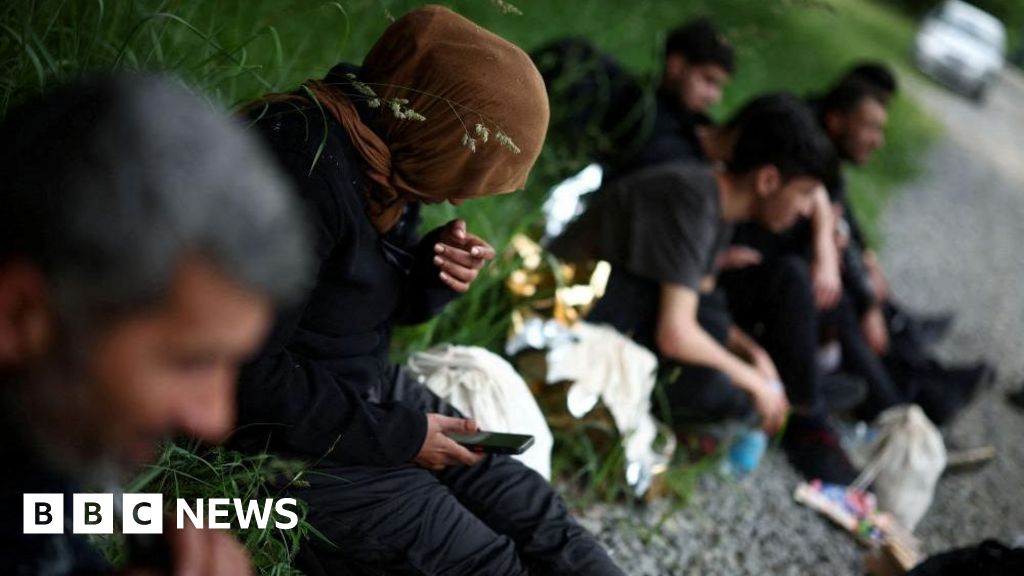Dafunkdoc_Unlimited
Theological Noncognitivist Since Birth
- Joined
- Jul 25, 2012
- Messages
- 45,062
- Reputation
- 8,149
- Daps
- 122,299
- Reppin
- The Wrong Side of the Tracks

Poland to temporarily suspend right to asylum, PM Tusk says
Donald Tusk said Russia and Belarus were encouraging migration into Poland in a bid to destabilise the EU.
www.bbc.com
Polish Prime Minister Donald Tusk has announced plans to temporarily suspend the right to asylum as part of a new migration strategy to combat irregular migration.
During a speech at a meeting of his centre-right Civic Coalition political grouping in Warsaw, Tusk said people smugglers - aided by Belarus and Russia - were abusing the right to asylum.
Since 2021, Poland has seen a huge increase in the number of people, mainly from the Middle East, Africa and Asia, crossing into the country illegally from Belarus.
Warsaw has accused Belarus and Russia of “hybrid warfare”, directing the flow of migrants towards the European Union in a bid to destabilise the bloc. Both countries deny this.
When the migration crisis began in August 2021, in that month alone, eight times as many people tried to cross the border illegally than had attempted to do so in the whole of 2020. Dozens continue to attempt to cross the border daily.
Tusk said he would present the new migration policy at a government meeting on 15 October.
“One of the elements of the migration strategy will be the temporary territorial suspension of the right to asylum,” the prime minister said. “I will demand this, I will demand recognition in Europe for this decision,” he added.
Under international law, countries are obliged to offer people the right to claim asylum. Tusk did not say how he would justify the move to his EU partners.
“We know very well how it is used by Lukashenko, Putin… by people smugglers, people traffickers, how this right to asylum is used exactly against the essence of the right to asylum,” he said. “Poland must take back 100% control over who comes to Poland,” he added.
Many of the migrants who cross into the country from Belarus do not stay, instead entering Germany. The trend has prompted Berlin to introduce checks on its border with Poland.
Tusk’s pro-EU coalition government surprised many by continuing a hard-line migration policy implemented by the previous right-wing Law and Justice government, which authorised pushbacks and built a 5.5-metre-high steel fence along 186km (115 miles) of its border with Belarus.
While it talked tough on migrants from Middle Eastern and Asian countries, the Law and Justice-led government issued the highest number of annual residence and work permits in the whole of the EU during much of its time in office.
Tusk’s coalition has continued the policy of pushbacks and re-introduced an exclusion zone on part of the border. In July, following the death of a 21-year-old soldier who was fatally stabbed by migrants on the border, the government pushed through parliament the decriminalisation of the use of firearms by security forces in self-defence in certain circumstances.
Opinion polls suggest much of the public supports the hard-line, with 86% of respondents supporting the use of weapons in self-defence by the security services.
Indeed, Foreign Minister Radoslaw Sikorski identified a tough migration policy by Civic Coalition as a key element in its electoral success in October last year.
“I don’t think we would have won if we hadn’t outflanked the then ruling party on the right on migration, if we hadn’t convinced the electorate that we will be as tough on physically protecting the Polish border as the previous government was, so we neutralised this issue,” Mr Sikorski told an audience at the John Hopkins School of Advanced International Studies in Washington in September.
But rights groups have expressed concern over the new government’s migration policy. NGOs estimate more than 130 migrants have died on both sides of Belarus’ border with Poland, Lithuania and Latvia since the crisis began.
“I never saw Donald Tusk as a human rights champion, but this is a new low,” Malgorzata Szuleka, a board member of the Warsaw-based Helsinki Foundation for Human Rights told the BBC.
“There is a humanitarian crisis on the border, but it is also an open migration route. We need to find a place for a rational discussion that is not so populistically driven,” she added.